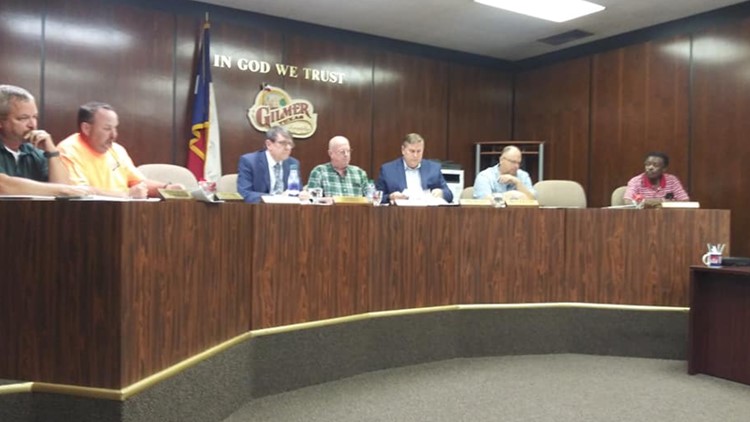A sixth Texas city jumped on board with the growing movement to protect unborn babies from abortion at the local government level this week.
On Tuesday, the Gilmer City Council voted 4-1 in favor of an ordinance declaring their city to be a sanctuary for unborn babies, CBS 19 reports. The ordinance prohibits abortions and bans abortion facilities from opening within city limits.
The other cities are Tenaha, Waskom, Omaha, Naples and Joaquin, all in Texas. Gilmer is the largest one yet, with a population of about 5,000, according to Texas Right to Life.
Mark Lee Dickson, director of East Texas Right to Life, is a leading advocate of the new pro-life ordinances.
“Those are human beings, just as human as me and you, and all we are saying here is in our cities, we do not want those kids to be killed,” Dickson told KLTV earlier this week.
He did express disappointment that the Gilmer ordinance, unlike those in the other cities, does not ban emergency contraception, such as the morning after pill, which may cause early abortions.
“Because of this these products that can cause an abortion are still on the shelves of businesses within the city, and some types of abortion services could still exist within the city limits,” according to Dickson’s website Sanctuary Cities for the Unborn. “This is a great concern to us and a reminder that the fight to end all abortions in Gilmer, Texas is far from over.”
Still, local citizens and pro-life advocates expressed thanks to the city council for taking a stand for life.
During the meeting Tuesday, “Melanie Wright, a citizen and director of Hannah House, a local maternity home, explained that Gilmer should care for expecting mothers instead of leaving them to predatory abortion clinics,” according to Texas Right to Life. “Many other citizens spoke in favor of the ordinance, pointing out that based on recent election results, more than 80 percent of the community should support the council taking this courageous stand for Life.”
Some lawyers have warned cities about passing the ordinances because of a potential legal challenge. The U.S. Supreme Court took away the power of state and local governments to protect unborn babies from abortion in Roe v. Wade.
PRO-LIFE COLLEGE STUDENT? LifeNews is looking for interns interested in writing, social media, or video creation. Contact us today.
But Dickson told LifeNews that the ordinances take this into account.
“Despite some things that are being said, the Gilmer Ordinance is enforceable,” he explained. “[It] has a public enforcement mechanism and a private enforcement mechanism. The public enforcement mechanism is about future enforcement.”
He said the public enforcement part of the ordinance fines abortionists $2,000 per abortion, but the penalty only would be enforced when Roe v. Wade is overturned.
“In other words, if you break the law today, you could be penalized for that crime years from now,” Dickson said. “The private enforcement mechanism does not have to wait upon the overturning of Roe v. Wade, and is in effect immediately. This part of the ordinance is about private lawsuits. When a child is killed by abortion, the family of that child … can sue the abortionist, the one who paid for the abortion, the one who drove the mother to the abortion, etc.”
A growing number of towns and cities have passed ordinances and resolutions this year to protect the unborn. An ordinance is a municipal government law or regulation. A resolution is a statement of support or opposition, but it does not have legal weight.
Many of these pro-life measures came in response to abortion activists’ increasingly radical pro-abortion agenda. All of the top Democratic presidential candidates support forcing taxpayers to fund abortions and oppose minor, common sense restrictions on abortions after viability. Many of them also voted against a bill to protect newborns from infanticide.
Several states, including New York, Illinois, Vermont and Rhode Island, also passed pro-abortion laws this year to allow viable, late-term unborn babies to be aborted for basically any reason up to birth.
In March, Roswell, New Mexico city leaders passed a pro-life resolution after state lawmakers considered a radical pro-abortion bill to expand late-term abortions. The bill narrowly failed to pass.
In New York state, Batavia city leaders and Putnam County legislators also passed resolutions condemning a radical new pro-abortion law in their state and supporting protections for the unborn.
In May, the Riverton City Council in Utah passed a similar resolution, declaring the city a “sanctuary for the unborn.” In June, the Utah County Commission unanimously voted in favor of a resolution supporting protections for unborn babies. The council in Highland, Utah and the city of Springdale, Arkansas also approved pro-life resolutions this summer.

Please click here to read the full story.
Author: Micaiah Bilger




